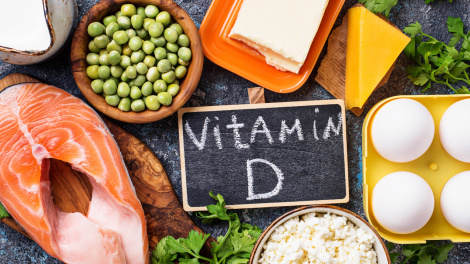Otherwise known as the “sunshine” vitamin, vitamin D plays a very important role in helping your body function. There’s a whole lot of complex science behind the production and metabolising of vitamin D, but we’ll just keep it simple for now. It’s a key player in protection against diabetes, muscular and heart diseases, cancer and depression. It’s not a miracle vitamin, nor more important than all the others; it just happens to be incredibly versatile. While it is essential for healthy bones, it also supports the immune system helping your body ward off infection and inflammation.
Vitamin D and Bone Health
Vitamin D is crucial to keeping your bones strong and healthy. Your body uses vitamin D to help absorb calcium in food, helping prevent fractures and brittle bones. Naturally, this becomes more important as you age, so getting your daily dose of vitamin D should be a priority. Osteoarthritis is a major issue among men and women later in life. Joint pain, knee muscle wasting, and decreased range of motion, all of which lead to severe pain and disability as the disease progresses, can be marginally curbed by vitamin D supplementation.
Vitamin D and Weight Loss
Some studies suggest that people suffering from obesity have low levels of vitamin D in their blood. Body fat traps the vitamin, making it harder for your body to access it. There is no concrete proof as to whether being overweight causes a low vitamin D count, nor whether the inverse could be true. However, some studies suggest that those looking to lose weight could benefit from a calorie-restricted diet with increased vitamin D intake.
Vitamin D and Depression
Perhaps the most common association with vitamin D is the impact it has on our mental health. Countries that are further away from the equator and therefore enjoy less sunshine experience population-wide vitamin D deficiencies far more than those closer. Minimal amounts of sun exposure or poor vitamin D intake often result in symptoms of depression and unexplained blues. If you live in one of these countries, it is important to introduce foods rich in vitamin D to your diet. If it doesn’t seem sufficient, ask your doctor about whether a supplement is necessary. See our recommendation of foods high in vitamin D here.
Vitamin D deficiency and diseases
There are many diseases associated with insufficient vitamin D levels. People with Osteoporosis or Osteopenia commonly show low vitamin D levels that have impaired calcium absorption.
Low levels of vitamin D have been linked to an increased risk of heart attacks, stroke and other heart-related diseases. Since there is no definitive proof that increasing vitamin D will decrease heart risk, researchers are still trying to figure out the optimal amount required to have a positive impact.
The link between many cancers and vitamin D has not yet been confirmed, but studies show a relatively strong correlation in prevention. New research suggests a higher level of vitamin D in the blood may lower the risk for breast, colon, and prostate cancer.
Other health issues that may be linked to vitamin D deficiencies include Metabolic Syndrome, Diabetes, and obesity.
Are you at risk of vitamin D deficiency?
You are most at risk for a vitamin D deficiency if you have a darker skin, are living in a higher altitude, or are over 50 – the reason being that older people tend to spend less time outside, and have less of the precursor for vitamin D. If you are obese or try to avoid and/or cover up in the sun you are also more likely to become vitamin D deficient.
How much Vitamin D do you need per day?
The recommended daily dietary allowance for vitamin D is 600 IU (International units) up to the age of 70. Anyone over the age of 70 should aim for about 800 IU through diet. Read our article on the best food sources of vitamin D to give you a bit or guidance.
While vitamin D is important, it is equally important not to overdo it. Very high doses of vitamin D can raise your blood calcium levels – eventually causing damage to your blood vessels, heart and kidneys – so be aware of the amount in the supplements you take.
Bonus: You can’t get too much vitamin D from the sun, so why not enjoy a daily sun-bath before the sun gets too high or in the late afternoon when UV radiation levels aren’t at their highest.
Here’s a quick tip for soaking up the sunshine safely: If your shadow is taller than you, UV exposure is likely to be lower. If your shadow is shorter than you (typically around midday), you are being exposed to higher levels of UV radiation.







Comments